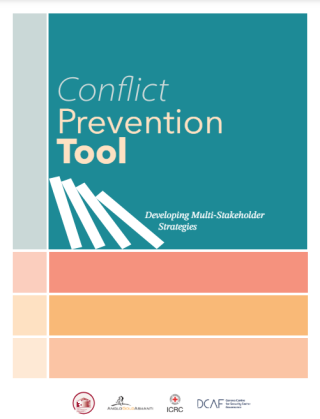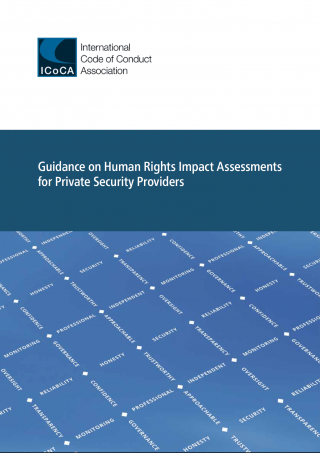Business in High Risk and Conflict Zones
170 articles:
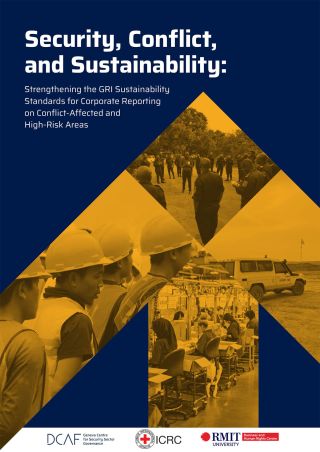
Security, Conflict, and Sustainability: Strengthening the GRI Sustainability Standards for Corporate Reporting on Conflict-Affected and High-Risk Areas
Managing and responding to human rights-related risks in conflict-affected and high-risk areas (CAHRAs) is challenging for many businesses. Yet, it is in these areas where the most egregious human rights abuses and violations of international humanitarian law (IHL) occur, and therefore must be a focus of attention for any business that wishes to operate sustainably and responsibly.

Child Rights and Security Handbook: An implementation companion to the Child Rights and Security Checklist (UNICEF, 2018)
Child Rights and Security Handbook: An implementation companion to the Child Rights and Security Checklist (UNICEF, 2018)

Responsibly undertaking resettlement activities is one means by which companies can positively contribute to development

Site-level Grievance and Community Response Mechanisms: A Practical Design and Implementation Guide for the Resource Development Industry (MAC, 2015)
Site-level Grievance and Community Response Mechanisms: A Practical Design and Implementation Guide for the Resource Development Industry (MAC, 2015)

Integrating Human Rights into Environmental, Social and Health Impact Assessments (IPIECA, 2013)
Integrating Human Rights into Environmental, Social and Health Impact Assessments (IPIECA, 2013)

Preventing Conflict in Exploration: A Toolkit for Explorers and Developers (PDAC, World Vision Canada, CDA, 2012)
Preventing Conflict in Exploration: A Toolkit for Explorers and Developers (PDAC, World Vision Canada, CDA, 2012)

Conflict-Sensitive Approaches to Development, Humanitarian Assistance and Peacebuilding: Resource Pack (APFO, CECORE, CHA, FEWER, International Alert, Saferworld, 2004)
Conflict-Sensitive Approaches to Development, Humanitarian Assistance and Peacebuilding: Resource Pack (APFO, CECORE, CHA, FEWER, International Alert, Saferworld, 2004)

A Business Guide to Conflict Impact Assessment and Risk Management (UN Global Compact, 2002)
A Business Guide to Conflict Impact Assessment and Risk Management (UN Global Compact, 2002)

Model Clauses for Agreements between Government Security Forces and Companies (VPI, 2016)
Model Clauses for Agreements between Government Security Forces and Companies (VPI, 2016)

Use of Security Forces: Assessing and Managing Risks and Impacts Guidance for the Private Sector in Emerging Markets (IFC, 2017)
Use of Security Forces: Assessing and Managing Risks and Impacts Guidance for the Private Sector in Emerging Markets (IFC, 2017)

Private Security Governance National Action Plans (NAPS) on Business and Human Rights (DIHR, Danish Institute for Human Rights & DCAF, Geneva Centre for Security Sector Governance, 2019)
Private Security Governance National Action Plans (NAPS) on Business and Human Rights (DIHR, Danish Institute for Human Rights & DCAF, Geneva Centre for Security Sector Governance, 2019)

Legislative Guidance Tool for States to Regulate Private Military and Security Companies (DCAF, 2016)
This Guidance Tool is aimed at parliamentarians and law and policymakers who undertake to develop new or to update existing laws for national regulation of the private military and security industry.

Academy Briefing No. 4 - The International Code of Conduct for Private Security Service Providers (ICoC)
Academy Briefing No. 4 - The International Code of Conduct for Private Security Service Providers (ICoC)

The Montreux Document on Pertinent International Legal Obligations and Good Practices for States Related to Operations on Private Military and Security Companies During Armed Conflict (2008)
The Montreux Document on Pertinent International Legal Obligations and Good Practices for States Related to Operations on Private Military and Security Companies During Armed Conflict (2008)

Engaging Private Security Providers: A Guideline for Non-Governmental Organisations (EISF, 2011)
Engaging Private Security Providers: A Guideline for Non-Governmental Organisations (EISF, 2011)

Private Military and Security Companies and Gender – (Tool 10) (DCAF, OSCE/ODIHR, UN-INSTRAW, 2008)
Private Military and Security Companies and Gender – (Tool 10) (DCAF, OSCE/ODIHR, UN-INSTRAW, 2008)

The Sarajevo Client Guidelines for the Procurement of Private Security Companies (SEESAC, 2006)
The Sarajevo Client Guidelines for the Procurement of Private Security Companies (SEESAC, 2006)

Dispute or Dialogue? Community perspectives on company-led grievance mechanisms (IIED, 2013)
Dispute or Dialogue? Community perspectives on company-led grievance mechanisms (IIED, 2013)

Responsible Business Advancing Peace: Examples from Companies, Investors & Global Compact Local Networks (UN Global Compact and PRI, 2013)
Responsible Business Advancing Peace: Examples from Companies, Investors & Global Compact Local Networks (UN Global Compact and PRI, 2013)

Recommendations for Hiring Private Security Providers (DCAF, ICRC, Socios Peru, and PeaceNexus, 2016)
Recommendations for Hiring Private Security Providers (DCAF, ICRC, Socios Peru, and PeaceNexus, 2016)

Ten Steps to Promote the Voluntary Principles on Security and Human Rights: The Peruvian Working Group Model (DCAF, ICRC, Socios Peru, and PeaceNexus, 2016)
Ten Steps to Promote the Voluntary Principles on Security and Human Rights: The Peruvian Working Group Model (DCAF, ICRC, Socios Peru, and PeaceNexus, 2016)

Improving Field Implementation of the Voluntary Principles for Security and Human Rights in South Kivu - DRC
Improving Field Implementation of the Voluntary Principles for Security and Human Rights in South Kivu - DRC

VPs working group in Lubumbashi: Supporting the management of security and human rights risks in the former Katanga - DRC
VPs working group in Lubumbashi: Supporting the management of security and human rights risks in the former Katanga - DRC

Developing resources to support training of public security forces assigned to extractives operations in Kenya
Developing resources to support training of public security forces assigned to extractives operations in Kenya

Supporting the sharing of lessons learnt on security and human rights good practice (DCAF and Fund For Peace FFP)
Supporting the sharing of lessons learnt on security and human rights good practice (DCAF and Fund For Peace FFP)

Strengthening civil society oversight capacity for the private security sector in Africa
Strengthening civil society oversight capacity for the private security sector in Africa

From Commitment to Impact: Experiences from Local Working Groups on Business, Security and Human Rights - Full Report (DCAF and Fund For Peace FFP)
From Commitment to Impact: Experiences from Local Working Groups on Business, Security and Human Rights - Full Report (DCAF and Fund For Peace FFP)

Report of the National Baseline Assessment: Promoting Voluntary Principles on Security and Human Rights in Nigeria (LITE-Africa, Nigerian Working Group and SHRIM)
Report of the National Baseline Assessment: Promoting Voluntary Principles on Security and Human Rights in Nigeria (LITE-Africa, Nigerian Working Group and SHRIM)

Sharing Good Practices Between Private Security Regulators in the Southern African Region
Sharing Good Practices Between Private Security Regulators in the Southern African Region

Impact of SHRIM Donors Support to DCAF Activities in the Democratic Republic of the Congo (DRC)
Impact of SHRIM Donors Support to DCAF Activities in the Democratic Republic of the Congo (DRC)

Doing Responsible Business in Armed Conflict: Rights, Risks and Responsibilities (Australian Red Cross and RMIT University)
Doing Responsible Business in Armed Conflict: Rights, Risks and Responsibilities (Australian Red Cross and RMIT University)

Human Rights Impact Assessment: Guidance and Toolbox (Danish Institute for Human Rights DIHR)
Human Rights Impact Assessment: Guidance and Toolbox (Danish Institute for Human Rights DIHR)

Human Rights and Business Learning Tool (Office of the UN High Commissioner for Human Rights and Global Compact, OHCHR and UNGC, 2013)
Human Rights and Business Learning Tool (Office of the UN High Commissioner for Human Rights and Global Compact, OHCHR and UNGC, 2013)
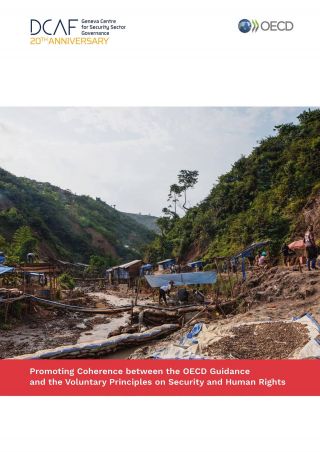
Promoting Coherence between the OECD Guidance and the Voluntary Principles on Security and Human Rights (DCAF, 2020)
Promoting Coherence between the OECD Guidance and the Voluntary Principles on Security and Human Rights (DCAF, 2020)

Seven Indicators of Corporate Best Practice in International Humanitarian Law (Australian Red Cross and RMIT University)
Seven Indicators of Corporate Best Practice in International Humanitarian Law (Australian Red Cross and RMIT University)

Learn about International Humanitarian Law (IHL): Free online training for businesses (Australian Red Cross)
Learn about International Humanitarian Law (IHL): Free online training for businesses (Australian Red Cross)

Voluntary Principles on Security and Human Rights Implementation Guidance Tools (ICMM, ICRC, IFC and IPIECA, 2011)
Voluntary Principles on Security and Human Rights Implementation Guidance Tools (ICMM, ICRC, IFC and IPIECA, 2011)

Using Relationship Data to Improve Business Practices: Measuring Company-Community Relationships at a South African Mine (Shift, 2021)
Using Relationship Data to Improve Business Practices: Measuring Company-Community Relationships at a South African Mine (Shift, 2021)

Auditing Implementation of Voluntary Principles on Security and Human Rights (Global Compact Network Canada, 2015)
Auditing Implementation of Voluntary Principles on Security and Human Rights (Global Compact Network Canada, 2015)

Measuring Quality of Relationships: Using ICMMs‚ Understanding Company-Community Relations‚ Toolkit (Shift, 2021)
Measuring Quality of Relationships: Using ICMMs‚ Understanding Company-Community Relations‚ Toolkit (Shift, 2021)

The Voluntary Principles on Security and Human Rights: An Implementation Toolkit for Major Project Sites (World Bank Group Multilateral Investment Guarantee Agency and Anvil Mining, 2008)
The Voluntary Principles on Security and Human Rights: An Implementation Toolkit for Major Project Sites (World Bank Group Multilateral Investment Guarantee Agency and Anvil Mining, 2008)

Voluntary Principles on Security and Human Rights: Performance Indicators (International Alert, 2008)
Voluntary Principles on Security and Human Rights: Performance Indicators (International Alert, 2008)

Voluntary Principles on Security & Human Rights National-Level Implementation Guidance Note (FFP & International Alert, 2010)
Voluntary Principles on Security & Human Rights National-Level Implementation Guidance Note (FFP & International Alert, 2010)

Voluntary Principles on Security and Human Rights Implementation Guideline - An extended summary (BP, 2008)
Voluntary Principles on Security and Human Rights Implementation Guideline - An extended summary (BP, 2008)

Guidebook for Conflict Management in Mining Industry of the Kyrgyz Republic (Eurasia Foundation of Central Asia and Kalikova & Associates, 2017)
Guidebook for Conflict Management in Mining Industry of the Kyrgyz Republic (Eurasia Foundation of Central Asia and Kalikova & Associates, 2017)

Human rights due diligence in conflict-affected settings: Guidance for extractives industries (International Alert, 2018)
Human rights due diligence in conflict-affected settings: Guidance for extractives industries (International Alert, 2018)

Multinationals and Conflict – International Principles and Guidelines for Corporate Responsibility in Conflict-affected Areas (SOMO, 2014)
Multinationals and Conflict – International Principles and Guidelines for Corporate Responsibility in Conflict-affected Areas (SOMO, 2014)

A Seat at the Table: Capacities and Limitations of Private Sector Peacebuilding (CDA Collaborative, Africa Center for Dispute Settlement, PRIO, 2018)
A Seat at the Table: Capacities and Limitations of Private Sector Peacebuilding (CDA Collaborative, Africa Center for Dispute Settlement, PRIO, 2018)

Training Tool: Doing Business in Conflict-affected Countries (UN Global Compact and Maplecroft, 2013)
Training Tool: Doing Business in Conflict-affected Countries (UN Global Compact and Maplecroft, 2013)

Human Rights Due Diligence in High Risk Circumstances: Practical Strategies for Businesses (Shift, 2015)
Human Rights Due Diligence in High Risk Circumstances: Practical Strategies for Businesses (Shift, 2015)

From Red to Green Flags - The Corporate Responsibility to Respect Human Rights in High-risk Countries (Institute for Human Rights and Business, 2011)
From Red to Green Flags - The Corporate Responsibility to Respect Human Rights in High-risk Countries (Institute for Human Rights and Business, 2011)

Guidance on Responsible Business in Conflict-Affected and Hight-Risk Areas: A Resource for Companies and Investors (UN Global Compact and Principles for Responsible Investment Initiative, 2010)
Guidance on Responsible Business in Conflict-Affected and Hight-Risk Areas: A Resource for Companies and Investors (UN Global Compact and Principles for Responsible Investment Initiative, 2010)

Reporting Business and Human Rights: A Handbook for Journalists, Communicators and Campaigners
Reporting Business and Human Rights: A Handbook for Journalists, Communicators and Campaigners

Practical Guidance on Human Rights and Security in the Colombian ASM Industry (DCAF and the Alliance for Responsible Mining, 2021)
Practical Guidance on Human Rights and Security in the Colombian ASM Industry (DCAF and the Alliance for Responsible Mining, 2021)

Conflict-Sensitive Business Practice: Guidance for Extractive Industries (International Alert, 2005)
Conflict-Sensitive Business Practice: Guidance for Extractive Industries (International Alert, 2005)

Baseline Study of Artisanal and Small-Scale Cobalt Mining in the Democratic Republic of the Congo
Baseline Study of Artisanal and Small-Scale Cobalt Mining in the Democratic Republic of the Congo

Enabling Economies of Peace - Public Policy for Conflict-Sensitive Business (Commissioned by the UN Global Compact, 2005)
Enabling Economies of Peace - Public Policy for Conflict-Sensitive Business (Commissioned by the UN Global Compact, 2005)

Mining the Disclosures 2019 - An Investor Guide to Conflict Minerals and Cobalt Reporting in Year Six
Mining the Disclosures 2019 - An Investor Guide to Conflict Minerals and Cobalt Reporting in Year Six

What's Needed: An Overview of Multi-Stakeholder and Industry Activities to Achieve Conflict-Free Minerals
What's Needed: An Overview of Multi-Stakeholder and Industry Activities to Achieve Conflict-Free Minerals

War, Law and Business: A free immersive e-learning module on international humanitarian law
War, Law and Business: A free immersive e-learning module on international humanitarian law

Oil and Gas Sector Guide on Implementing the UN Guiding Principles on Business and Human Rights (Shift and IHRB, 2013)
Oil and Gas Sector Guide on Implementing the UN Guiding Principles on Business and Human Rights (Shift and IHRB, 2013)

Human Rights Due Diligence Process: A Practical Guide to Implementation for Oil and Gas Companies (IPIECA, 2012)
Human Rights Due Diligence Process: A Practical Guide to Implementation for Oil and Gas Companies (IPIECA, 2012)

Oil and Gas Industry Guidance on Voluntary Sustainability Reporting (IPIECA, API and OGP, 2015)
Oil and Gas Industry Guidance on Voluntary Sustainability Reporting (IPIECA, API and OGP, 2015)

10 Steps to Maintain Security in Compliance with Human Rights(Voluntary Principles Initiative VPI, 2022)
10 Steps to Maintain Security in Compliance with Human Rights(Voluntary Principles Initiative VPI, 2022)
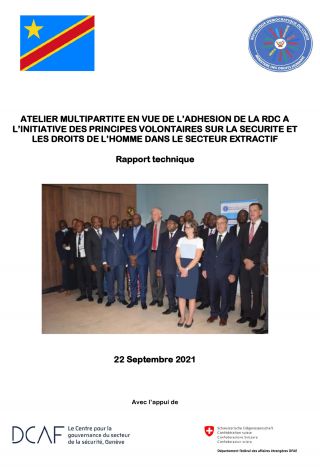
Rapport de l'atelier multipartite sur l'adhésion de la RDC à l'initiative des Principes Volontaires du 22.09.2021 à Kinshasa
Rapport de l'atelier multipartite sur l'adhésion de la RDC à l'initiative des Principes Volontaires du 22.09.2021 à Kinshasa

International Standards for Responsible Business in Conflict-Affected and Fragile Environments: An Overview
International Standards for Responsible Business in Conflict-Affected and Fragile Environments: An Overview

Protect, Respect and Remedy: a Framework for Business and Human Rights (Report for the UN Human Rights Council, 2008)
Protect, Respect and Remedy: a Framework for Business and Human Rights (Report for the UN Human Rights Council, 2008)

Guiding Principles on Business and Human Rights: Implementing the United Nations "Protect, Respect and Remedy" Framework (United Nations Human Rights, 2011)
Guiding Principles on Business and Human Rights: Implementing the United Nations "Protect, Respect and Remedy" Framework (United Nations Human Rights, 2011)

The Corporate Responsibility to Respect Human Rights: An Interpretive Guide (United Nations Human Rights, 2012)
The Corporate Responsibility to Respect Human Rights: An Interpretive Guide (United Nations Human Rights, 2012)

Shared Space Under Pressure: Business Support for Civic Freedoms and Human Rights Defenders (BHRRC & ISHR, 2018)
Shared Space Under Pressure: Business Support for Civic Freedoms and Human Rights Defenders (BHRRC & ISHR, 2018)

Gender-responsive Due Diligence for Business Actors: Human Rights-Based Approaches (Geneva Academy, 2018)
Gender-responsive Due Diligence for Business Actors: Human Rights-Based Approaches (Geneva Academy, 2018)

Doing Business with Respect for Human Rights: A Guidance Tool for Companies (Shift, Oxfam and Global Compact Network Netherlands, 2016)
Doing Business with Respect for Human Rights: A Guidance Tool for Companies (Shift, Oxfam and Global Compact Network Netherlands, 2016)

Factsheet: How can companies respect the rights of human rights defenders when addressing security-related challenges?
Factsheet: How can companies respect the rights of human rights defenders when addressing security-related challenges?

Case Study: How can multi-stakeholder working groups help companies address security and human rights challenges?
Case Study: How can multi-stakeholder working groups help companies address security and human rights challenges?

Case Study: How can companies use training and incentives to encourage public security forces to respect human rights?
Case Study: How can companies use training and incentives to encourage public security forces to respect human rights?

Heightened Human Rights Due Diligence for Business in Conflict-Affected Contexts: A Guide (UNDP and UN Working Group on Business and Human Rights, June 2022)
Heightened Human Rights Due Diligence for Business in Conflict-Affected Contexts: A Guide (UNDP and UN Working Group on Business and Human Rights, June 2022)
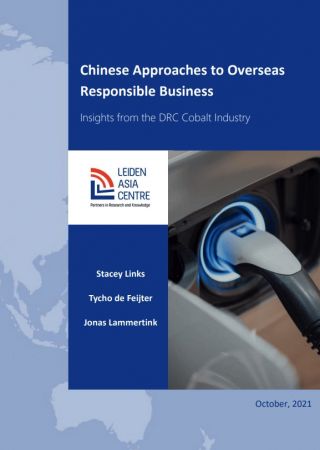
Chinese Approaches to Overseas Responsible Business: Insights from the DRC Cobalt Industry
Chinese Approaches to Overseas Responsible Business: Insights from the DRC Cobalt Industry

DCAF Submission to the Global Reporting Initiative’s public consultation on the Global Sustainability Standards Board Workplan 2023-2025
DCAF Submission to the Global Reporting Initiative’s public consultation on the Global Sustainability Standards Board Workplan 2023-2025

ICRC, ARC, and RMIT Submission to the Global Reporting Initiative’s public consultation on the Global Sustainability Standards Board Workplan 2023-2025
ICRC, ARC, and RMIT Submission to the Global Reporting Initiative’s public consultation on the Global Sustainability Standards Board Workplan 2023-2025

Addressing Security and Human Rights Challenges in Complex Environments Toolkit - Updated Edition (DCAF, ICRC and GCBHR, 2022)
Addressing Security and Human Rights Challenges in Complex Environments Toolkit - Updated Edition (DCAF, ICRC and GCBHR, 2022)

Human Rights Translated 2.0: A Business Reference Guide (Monash University, OHCHR, UNGC, 2017)
Human Rights Translated 2.0: A Business Reference Guide (Monash University, OHCHR, UNGC, 2017)

DCAF SSR Paper 13 - Business and Security Sector Reform: The Case for Corporate Security Responsibility (Mendes, 2015)
DCAF SSR Paper 13 - Business and Security Sector Reform: The Case for Corporate Security Responsibility (Mendes, 2015)

OECD Due Diligence Guidance for Responsible Supply Chains of Minerals from Conflict-Affected and High-Risk Areas (2016)
OECD Due Diligence Guidance for Responsible Supply Chains of Minerals from Conflict-Affected and High-Risk Areas (2016)

Practical actions for companies to identify and address the worst forms of child labour in mineral supply chains (OECD, 2017)
Practical actions for companies to identify and address the worst forms of child labour in mineral supply chains (OECD, 2017)

Human Rights in the Mining and Metals Industry - Overview, Managment Approach and Issues (ICMM, 2009)
Human Rights in the Mining and Metals Industry - Overview, Managment Approach and Issues (ICMM, 2009)

Start Here: Sustainability for Exploration, Development and Small Producing Mining Companies (NBS, 2014)
Start Here: Sustainability for Exploration, Development and Small Producing Mining Companies (NBS, 2014)

Countering the Resource Curse: Promoting good governance and human rights in the extractive sector in Madagascar (Search for Common Ground, 2016)
Countering the Resource Curse: Promoting good governance and human rights in the extractive sector in Madagascar (Search for Common Ground, 2016)

Women, Communities and Mining: The Gender Impacts of Mining and the Role of Gender Impact Assessment (Oxfam Australia, 2009)
Women, Communities and Mining: The Gender Impacts of Mining and the Role of Gender Impact Assessment (Oxfam Australia, 2009)

Due Diligence Guidance for Meaningful Stakeholder Engagement in the Extractive Sector (OECD, 2017)
Due Diligence Guidance for Meaningful Stakeholder Engagement in the Extractive Sector (OECD, 2017)

A Strategic Approach to Early Stakeholder Engagement - Good Practice Handbook for Junior Companies in the Extractive Industries (IFC, 2013)
A Strategic Approach to Early Stakeholder Engagement - Good Practice Handbook for Junior Companies in the Extractive Industries (IFC, 2013)

How Business Can Encourage Governments to Fulfil their Human Rights Obligations (United Nations Global Compact, 2010)
How Business Can Encourage Governments to Fulfil their Human Rights Obligations (United Nations Global Compact, 2010)

DCAF – Geneva Centre for Security Sector Governance
Business and Security Division
www.businessandsecurity.dcaf.ch
Chemin Eugène-Rigot 2E,
CH-1202 Geneva Switzerland
Tel: +41 (0) 22 730 94 18
Contact us

International Committee of the Red Cross (ICRC)
www.icrc.org
Avenue de la Paix 19, 1202 Geneva, Switzerland
Economic Adviser
Department of International Law and Policy
Tel: +41 (0) 22 734 6001
Contact us


















































